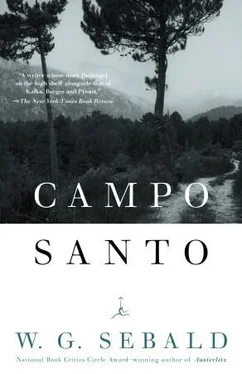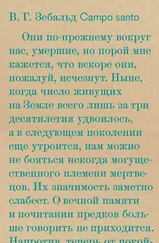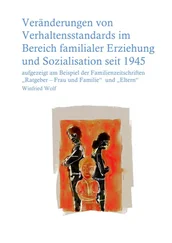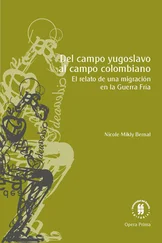Winfried Sebald - Campo Santo
Здесь есть возможность читать онлайн «Winfried Sebald - Campo Santo» весь текст электронной книги совершенно бесплатно (целиком полную версию без сокращений). В некоторых случаях можно слушать аудио, скачать через торрент в формате fb2 и присутствует краткое содержание. Год выпуска: 2011, ISBN: 2011, Издательство: Random House, Inc., Жанр: Современная проза, Публицистика, на английском языке. Описание произведения, (предисловие) а так же отзывы посетителей доступны на портале библиотеки ЛибКат.
- Название:Campo Santo
- Автор:
- Издательство:Random House, Inc.
- Жанр:
- Год:2011
- ISBN:9780307433039
- Рейтинг книги:3 / 5. Голосов: 1
-
Избранное:Добавить в избранное
- Отзывы:
-
Ваша оценка:
Campo Santo: краткое содержание, описание и аннотация
Предлагаем к чтению аннотацию, описание, краткое содержание или предисловие (зависит от того, что написал сам автор книги «Campo Santo»). Если вы не нашли необходимую информацию о книге — напишите в комментариях, мы постараемся отыскать её.
Dazzling in its erudition, accessible in its deep emotion, Campo Santo confirms Sebald’s status as one of the great modern writers who divined and expressed the invisible connections that determine our lives.
“W. G. Sebald exemplified the best kind of cosmopolitan literary intelligence — humane, digressive, deeply erudite, unassuming and tinged with melancholy. . In [Campo Santo] Sebald reveals his distinctive tone, as his winding sentences gradually mingle together curiosity and plangency, learning and self-revelation. . [Readers will] be rewarded with unexpected illuminations.”
— The Washington Post Book World “Brilliant … bursting with flavors … at once precise and luscious … [Campo Santo] reminds us what a significant loss [Sebald’s] early passing was to the literary world.… [The] travel essays on Corsica are absolute gems.… [D]iscussions of Nabokov, Kafka, Gunter Grass, and the schizophrenic poet Herbeck … provide a satisfaction as rare as a perfect meal.”
— The Boston Globe “[A] darkly companionable voice … This magnificent writer may have left abruptly, but his own shadow lingers.”
— The New York Times Book Review “Max Sebald has begun to be widely recognized as one of the most important prose writers of the past 20 years.”
— The Economist “Nuanced … multidimensional … Ruminative and elegiac, the late W. G. Sebald wove threads of timelessness connecting past and present.”
— The Dallas Morning News “All of Sebald’s books are about journeys … [and he] is an entertaining guide.”
— The New York Review of Books “[Sebald] is prone to visions, hallucinations, and premonitions, usually induced by a confrontation with a personal memory or a historical site. These are the source of the subdued horror of much of Sebald’s work, and also of its very dry humor.… Four fragments of a literary work about a trip to Corsica … have the virtues of Sebald’s best work, with its odd blend of fiction, memoir, history, and travelogue.”
— The New York Sun “Stunning … intensely observant, erudite, lyrical, and provocative … Detailed descriptions of Sebald’s wanderings on [Corsica] turn into musings of astonishing beauty and insight into history, environmental decimation, and our feelings about death. These arresting meditations, brilliant syntheses of thought and feeling, are followed by masterful, passionate critical essays expressing Sebald’s belief in the healing power of literature and our obligation to remember the past and respect life in all its wonders and mysteries
— Booklist “[A] masterful translation … Sebald was a beautiful and intelligent writer.”
— Publishers Weekly “If you thought literary modernism was dead, guess again. The spirit of such masters as Kafka and Borges lives on in the [work] of W. G. Sebald.”
— The Wall Street Journal












